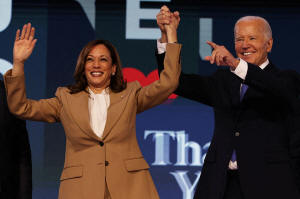As Democrats gather, investors gauge market impact from a Harris
administration
 Send a link to a friend
Send a link to a friend
 [August 21, 2024] By
Lewis Krauskopf [August 21, 2024] By
Lewis Krauskopf
NEW YORK (Reuters) - Investors are grappling with the market
implications of a possible Kamala Harris presidential administration,
which could pressure corporate profits through higher taxes while
weighing on consumer staples and boosting solar energy.
Harris' nomination is in focus this week at the Democratic convention
after her late entry following President Joe Biden's withdrawal
tightened the race against Republican candidate Donald Trump.
Investors’ views on markets are typically shaped by factors such as the
economy's strength and the trajectory of interest rates, but the
question of how a Harris White House could approach policy, regulations
and taxation looms large.
"She seems to be on a track to be more aggressive than the Biden
administration on a lot of these consumer issues that go right to the
market," said Frank Kelly, senior political strategist at investment
firm DWS Group, citing Harris' recent economic proposals and her record
as a U.S. senator and California attorney general.
On Monday, Harris proposed increasing the corporate tax rate to 28% from
21%, a plan her campaign characterized as a way to “ensure billionaires
and big corporations pay their fair share."
The plan contrasts with Trump's record, after he slashed the corporate
tax rate to 21% from 35% as president, and as he seeks to make other tax
breaks permanent.

A higher tax rate would help reduce the U.S. budget deficit by $1
trillion over the next decade, according to the nonpartisan Committee
for a Responsible Federal Budget, addressing an issue that has worried
some investors.
Higher taxes could also bite into corporate profits. Each percentage
point change in the statutory domestic corporate tax rate should shift
S&P 500 earnings by slightly less than 1%, strategists at Goldman Sachs
said.
“Anything that reduces earnings should ... have a negative impact on the
stock market," said Peter Tuz, president of Chase Investment Counsel.
However, “until you see the proposal, there may be various offsets."
Many of the proposals from both candidates would require approval from
Congress, which is narrowly divided between Republicans and Democrats.
Control of the House of Representatives and Senate will be in contention
on Nov. 5.
Harris' tax proposal could face serious obstacles in a Congress that is
divided or under Republican control.
[to top of second column] |

U.S. President Joe Biden and Democratic presidential candidate and
U.S. Vice President Kamala Harris gesture during Day one of the
Democratic National Convention (DNC) in Chicago, Illinois, U.S.,
August 19, 2024. REUTERS/Alyssa Pointer/File Photo

Harris and Trump are locked in a tight presidential race that will
likely be decided in a handful of battleground states, polls show.
Harris in recent weeks has taken the lead on the PredictIt politics
betting platform.
FOOD, HEALTHCARE, SOLAR STOCKS
Mounting expectations that Trump would beat Biden sparked a
so-called Trump trade in U.S. stocks last month, lifting areas of
the market seen as benefiting from tax cuts and regulatory easing,
including shares of smaller U.S. companies and cryptocurrencies.
Harris outlined a plan last week to ban price gouging on food and
groceries, which her campaign says aims to stop big corporations
from exploiting consumers.
Harris also is pushing to lower healthcare costs, with analysts
expecting she could expand negotiating powers over prescription drug
prices enacted during the Biden administration.
Lori Calvasina, head of global equity strategy research at RBC
Capital Markets, said in a note this week that the proposals could
weigh on consumer staples and healthcare stocks.
Harris also pledged last week to introduce a child tax credit,
however, which could lead to a "pretty meaningful boost to consumer
spending," said Garrett Melson, portfolio strategist at Natixis
Investment Managers Solutions.
Such spending particularly could benefit retailers and other
consumer-related areas, he said.
King Lip, chief strategist at BakerAvenue Wealth Management, expects
clean-energy initiatives launched under Biden to continue under a
Harris administration.
That could offer relief to shares of solar companies, which have
faced headwinds from elevated U.S. interest rates, Lip said. The
Invesco Solar ETF is down over 20% this year.
(Reporting by Lewis Krauskopf; Editing by Ira Iosebashvili and Rod
Nickel)
[© 2024 Thomson Reuters. All rights
reserved.]
This material may not be published,
broadcast, rewritten or redistributed.
Thompson Reuters is solely responsible for this content.
 |